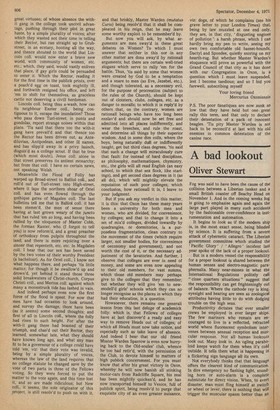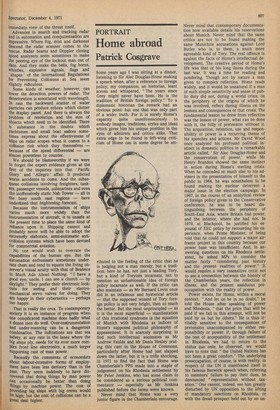A bad lookout
Oliver Stewart
Fog was said to have been the cause of the collision between a Liberian tanker and a small British coaster off Beachy Head on November 1. And in the coming weeks fog is going to emphasise again and again the large part played in many such accidents by the fashionable over-confidence in instrumentation and automation.
It begins to look as if the modern ship is, in the most exact sense, being blinded by science. It is suffering from a severe attack of cybernetic cataract. The Liberian government committee which studied the 'Pacific Glory' / ' Allegro ' incident last year spoke of the lack of a proper lookout.
But in a modern vessel the responsibility for a proper lookout is shared between the human senses and electro-magnetic paraphernalia. Many near-misses in what the International Regulations politely call " close quarters situations" suggest that the responsibility can get frighteningly out of balance. Where the cathode ray is king, eyesight and hearing are seen as zoological attributes having little to do with dodging trouble on the high seas.
Productivity dictates that ever smaller crews be employed in ever larger ships. The few mariners who remain are encouraged to live in a reflected, refracted world where fluorescent symbolism intervenes between sensual reception and muscular response. Not all human lookouts look out. Many look in. An ogling paraboloid keeps watch for them when it's cold outside. It tells them what is happening in a flickering sign language all its own.
Not everybody thinks that that language offers the clearest kind of communication. In dire emergency no flashing light, sounding horn or auto-alarm is a complete substitute for direct vision. When, to avert disaster, man must fling himself at switch or wheel or lever, there is nothing that will trigger the muscular spasm better than an immediate view of the threat itself.
Advances •in search and tracking radar and in automation and computerisation are impressive. Where fog, mist and darkness descend the radar scanner comes to the rescue. Radar beams and Doppler closing Speed analysers seem sometimes to make the peering eye of the 'lookout man out of date. And they make the bells, fog horns, Whistles, explosive signals, flags and 'shapes' of the International Regulations for Preventing Collisions at Sea seem Slightly ridiculous.
Some kinds of weather, however, can lower the detection powers of radar. The deterioration is associated with wavelength. In rain the backward scatter of water Particles can produce echoes which clutter the display panel. And there is always the Problem of resolution and the size of Objects which need to be identified. There is substance in the doubts which Yachtsmen and small boat sailors sometimes express about •the effectiveness of blips on radar scopes when it comes to a collision risk which they themselves — because of the speed .differential — are almost powerless to counter.
We should be blameworthy if we were to forget the expert evidence given at the first of the inquiries into that Pacific Glory' and ' Allegro ' affair. It predicted worse accidents to come. And the subsequent collisions involving freighters, tankers, passenger vessels, submarines and even the inoffensively static Nab Tower — all in the busy south east regions — have underlined that frightening forecast..
Because the instrumentation of ships varies much more widely than the instrumentation of aircraft, it is unsafe at the present time to place the same kind of reliance upon it. Shipping cannot and Probably never will be able to adopt the extremely elaborate, semi-automatic anticollision systems which have been devised for commercial aviation.
No cne would wish to overrate the capabilities of the human eye. But the automation enthusiasts sometimes underrate them and tend to equate the living observer's visual acuity with that of Beatrice in Much Ado About Nothing. "I have a good eye, uncle. I can see a church — by daylight." They prefer their electronic lookouts for seeing and their electromechanical servo valves for doing. They are happy in their cybernetics — perhaps too happy.
That is really the crux. To contemporary society it is an instance of progress when One complicated machine does badly what a dozen men do well. Over-instrumentation and under-manning can be a dangerous combination. The indications are that sea safety, at any rate in the lanes where the big ships ply, needs for its ever more complex front fine electronics, a much larger supporting cast of man power.
Recently the comments of economists about labounintensive forms of employment have been less derisory than in the Past. They seem suddenly to have discovered that doing things by man power can occasionally be better than cluing things by machine power. The cost of Providing big ships with big crews would be high; but the cost of collisions can be a great deal higher.











































 Previous page
Previous page